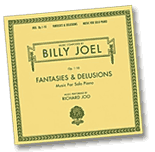Billy Joel's Classical Crossover
Is it a bold adventure or a grand delusion?

Credit where credit's due: It took guts for
It isn't completely clear why an enterprise of this sort invites that kind of sneering, but it does, frequently and almost irresistibly. Perhaps because the history of popular musicians trying their hand at classical composition is a melancholy one. (Musicians who are primarily performers rather than composers have managed the transition more smoothly;
Oddly, when the move is in the other direction, it has sometimes proved successful: One can go back to the 19th century, to Brahms and Dvorak—the former's waltzes and Hungarian dances and the latter's Slavonic dances are stabs at popular forms that have stood the test of time—and the following century witnessed Schoenberg, Weill, and Britten writing haunting cabaret songs and saw Victor Herbert, Vladimir Dukelsky (under his adopted name, Vernon Duke), and Leonard Bernstein writing very successfully for the Broadway stage. But when it comes to popular songwriters aiming for the concert hall, the list pretty much begins and ends with
And now along comes
Like
The most impressive, most assured aspect of these pieces is the way Joel writes for his instrument. Maybe that's to be expected; he does, after all, in other settings style himself "Piano Man." But he isn't giving us camouflaged rock licks. This music doesn't sound like a tamed or domesticated version of his popular work; it's in a different idiom entirely. Listen to the natural way he devises virtuoso keyboard figuration here, for example. It's completely convincing.
Something else about this same passage will also strike anyone familiar with the standard repertory, and that is its resemblance to the music of Rachmaninoff. Which suggests a problem that bedevils this record throughout: While the music almost never sounds like Billy Joel, songwriter, it almost always sounds like … well, like a whole bunch of other people. Like Frederick ("Piano Man") Chopin. Or Robert ("Piano Man") Schumann. Or Claude ("Piano Man") Debussy. Or Gabriel ("Piano Man") Fauré. The harmonic language is always very conservative—there isn't a bar of music on the entire CD, not a single chord, that couldn't have been written before the dawning of the 20th century—and it's all reminiscent of earlier composers.
I suppose Joel could say in his own defense, as film composer Dimitri Tiomkin once did, that he only steals from the best. And as pastiche, these pieces are impressive. But they aren't really at, or even near, the level of their models. Yes, they're always attractive, the piano writing is always skillful, and they usually come to an emotionally satisfying climax of sorts. They could provide background music at any cocktail party anywhere without ever causing the slightest consternation. The best of them might even be slipped into a varied recital program without raising many eyebrows. But they just aren't all that interesting.
The performances, by
The liner notes contain a few gnomic credits that lead one to question aspects of the disc, and I would be remiss if I didn't mention them. "Music preparation" is credited to Glen Cortese, and "Additional arrangements" to Richard Hyung-Ki Joo (that's the disc's pianist, incidentally), Anthony Newman, Yuliya Gorenman, and Christopheles Bresnahan. I don't know exactly what these credits signify, but it's at least possible that some of the work we ordinarily consider composition was the product of hands other than
But assuming the assistance rendered was essentially mechanical, it's fair to say, on balance, that

